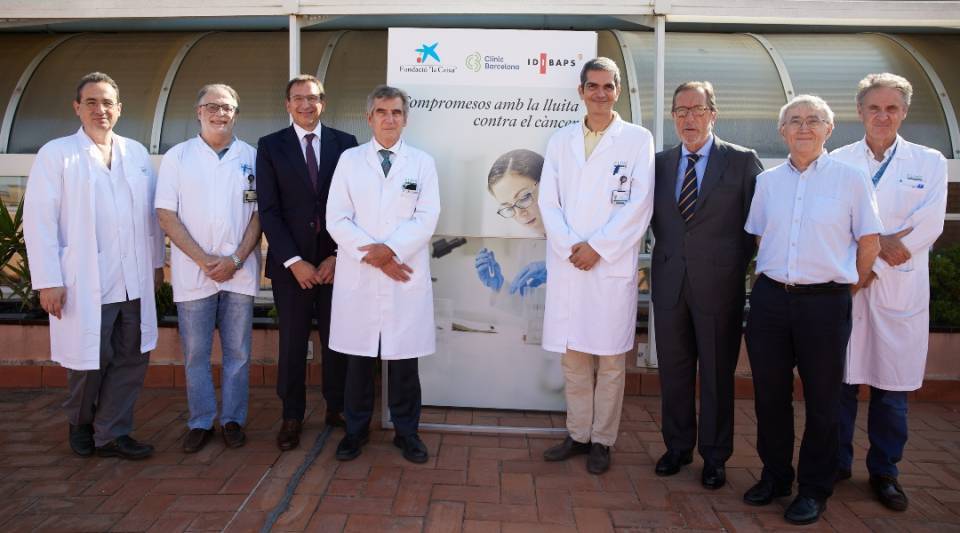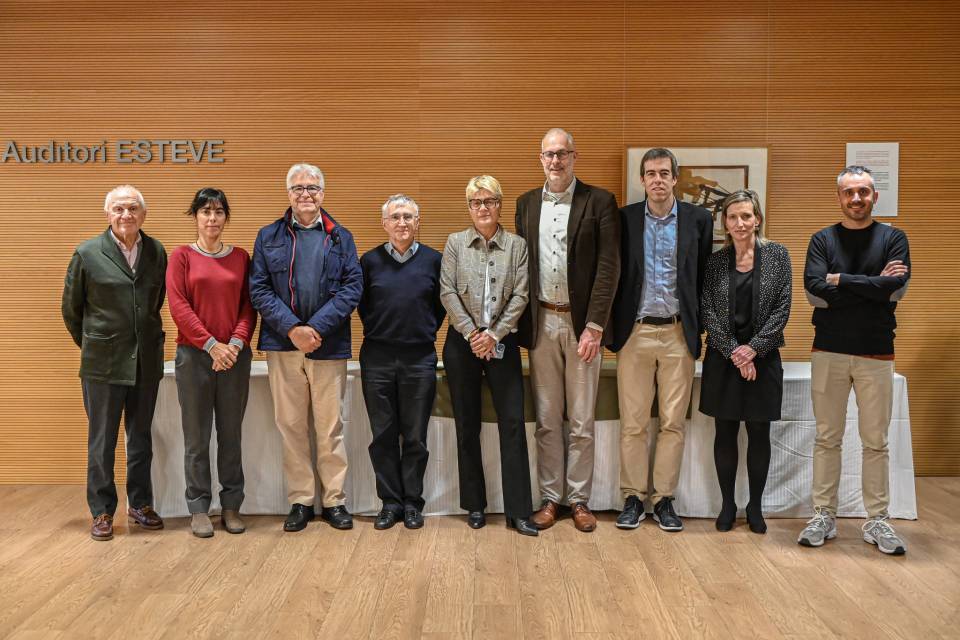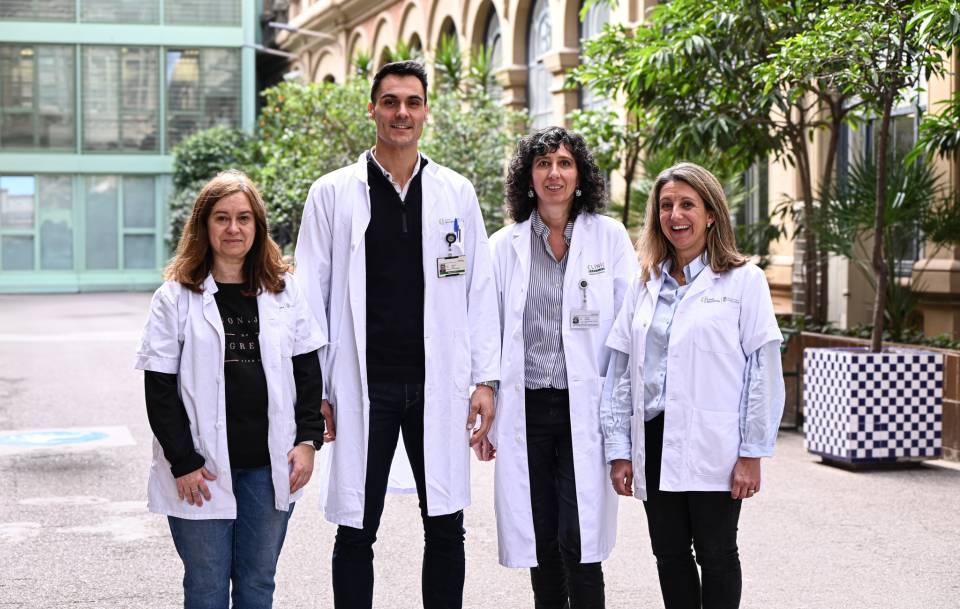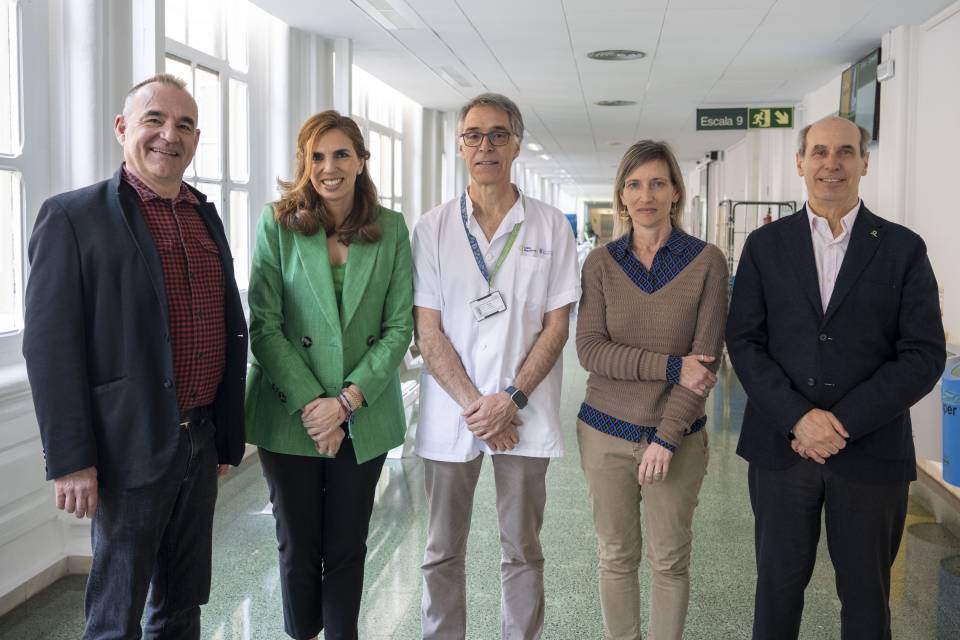The director general of the ”la Caixa” Foundation, Antoni Vila Bertrán; the director general of the Hospital Clínic Barcelona, Josep Maria Campistol, and the director of FRCB-IDIBAPS, Elías Campo, have signed the renewal of the collaboration agreement between both institutions to improve people’s health through immunotherapy for cancer and translational research programmes.
During the period 2023-2026, the ”la Caixa” Foundation will contribute 4.6 million euros to the Hospital Clínic Barcelona to promote the Cellular Immunotherapy: From Research to Care Programme, developed by the CaixaResearch Immunotherapy Research Unit, and also the CaixaResearch Cancer Translational Research Programme, and will continue to support the BITRECS Programme.
In the words of the director general of the ”la Caixa” Foundation, Antoni Vila Bertrán: “Improving people’s health and their quality of life is one of our organization's fundamental objectives. To achieve this goal, we collaborate closely with institutions that are true benchmarks in their field, such as the Hospital Clínic Barcelona for immunotherapy to treat cancer. Thanks to its researchers, devoted to finding new treatment options, innovative products are being developed in the clinical field that manage to change lives".
The ”la Caixa” Foundation will be launching a corporate campaign next week to highlight the work of the researchers. Led by Dr. Manel Juan, head of the Immunology Service at the Hospital Clínic-IDIBAPS Biomedical Diagnostics Centre and in charge of the CaixaResearch Immunology Research Unit, the campaign underlines the great social impact that today’s research can have on our health in the future.
“The collaboration with the ”la Caixa” Foundation reflects the vocation of the three organizations in the comprehensive care of patients, offering them and their families the support and assistance they need”, says Dr. Josep M. Campistol. “At the Hospital Clínic-IDIBAPS we shall continue to promote research of excellence in the field of immunotherapy, both to address oncological diseases and diseases of immune origin. The hospital already has two CAR T-cell therapies to treat leukaemia and myeloma, and our goal is to deliver these innovative therapies and others that we develop to as many people as possible”, he adds.
“The ”la Caixa” Foundation helps us in two major challenges involving current biomedical research: promoting collaboration between basic and clinical researchers to solve the most pressing problems in clinical practice, and encouraging interest in this translational research among young doctors. These are two aspects that lay the foundations for the rapid transfer of research results to clinical practice”, says Dr. Elías Campo.
Cellular Immunotherapy: From Research to Care
The ”la Caixa” Foundation and the Hospital Clínic Barcelona will continue to collaborate to strengthen the current capacities of the CaixaResearch Immunotherapy Research Unit, which opened in 2019 under the leadership of Dr. Manel Juan.
Immunotherapy is a type of cancer treatment that helps the patient’s own immune system to fight the disease by extracting cells and modifying them in order to attack the cancer effectively. This represents a change in strategy when compared to traditional cancer therapies such as chemotherapy or radiotherapy.
In order to continue promoting this academic approach, the ”la Caixa” Foundation will provide 4 million euros to support the CaixaResearch Immunotherapy Research Unit’s work from 2023 to 2026. This will allow for the development of new cellular immunotherapy products to treat cancer patients or those with other immune diseases, from basic research to the approval for clinical use, at least for use under hospital exemption. There are four lines of work: the development of methods to improve new cellular immunotherapy products; the production of cellular vaccines and new clinical trials; the production of cellular immunotherapy based on specific natural T cells, and based on genetically modified T cells (CAR-T).
As a result of a previous agreement between the two institutions (2019-2022), the unit has already developed some new cellular immunotherapy-based treatments for cancer patients who have already exhausted all the available conventional lines of treatment and the clinical trials, and thus have no other therapeutic alternatives.
In this way, support has been given to the CAR T-cell therapy ARI-0001, also funded through public grants, for patients with lymphoblastic leukaemia. This is the first CAR T-cell therapy developed entirely in Europe to receive approval from regulatory agencies (the Spanish Agency of Medicines and Medical Devices, in February 2021) and PRIME (Priority Medicine) designation by the European Medicines Agency, in February 2022. More than 185 patients have already been treated with this medicine in different procedures, either as a hospital exemption or on a compassionate use basis. According to the results of the phase II clinical trial, in which 38 people with acute lymphoblastic leukaemia participated, in 84% of the patients the disease showed a complete response to the treatment. Now, a new trial has opened for patients in 10 Spanish hospitals in which 18 patients have already been treated.
The CAR T-cell therapy ARI-0002h has also been developed, the first in Europe for multiple myeloma―the second most common cancer of the blood―and it has been used to treat 75 patients. According to the results published this week in The Lancet Oncology, after an 18-month follow-up, around 70% of the 30 patients who took part showed complete remission of the disease. This therapy is pending approval by the Spanish Agency of Medicines and Medical Devices.
CaixaResearch Translational Cancer Research Programme
Along the lines of translating results to clinical settings, this agreement between the ”la Caixa” Foundation and the Hospital Clínic will promote the new CaixaResearch Translational Cancer Research Programme. It is a multidisciplinary programme for dealing with specific health challenges through close collaboration between basic, translational and clinical researchers. The aim of the programme is to improve the understanding of and approach to cancer through the application of innovative biomedical technologies, such as artificial intelligence, single-cell sequencing, spatial transcriptomics, patient-derived organoids, and genetically engineered mouse models.
After evaluation by an external scientific committee, the ”la Caixa” Foundation will subsidize with 406,000 euros the joint work of 6 research groups and 98 clinical, translational and basic professionals from FCRB-IDIBAPS, led by Dr. Josep Maria Llovet. The 6 groups are experts in the study of hepatobiliary, colorectal, pancreatic, gastric and skin tumours, and have an excellent track record of publications and grants in the areas of at-risk patient definition, early detection strategies and the exploration of molecular therapies in experimental models and clinical trials.
BITRECS Programme
The new agreement also renews support for the BITRECS Programme (Biomedicine International Training Research Programme for Excellent Clinician-Scientists) for the period 2023-2026. This is a programme of grants specifically for clinicians who wish to develop their research careers. The ”la Caixa” Foundation will allocate 243,000 euros to hire a clinical expert so that he or she can devote himself or herself intensively to biomedical research.
The programme, which was launched in 2019, has already promoted the translation into clinical practice of scientific research results on COVID, multiple myeloma, HIV and autoimmune encephalitis, thanks to the hiring, in the previous agreement, of 7 researchers who in 3 years have published 25 articles in high-impact scientific journals.
A fruitful collaboration between the two institutions
The signed agreement is part of the close relationship the two institutions have maintained for almost two decades, during which time they have promoted joint strategic projects, such as the Barcelona Institute for Global Health (ISGlobal) and the Clínic Foundation for Biomedical Research (FCRB). Moreover, the ”la Caixa” Foundation has supported projects such as the CaixaResearch Artificial Placenta project, led by BCNatal, and numerous research projects at the August Pi i Sunyer Biomedical Research Institute (IDIBAPS) through the CaixaResearch Research and the CaixaImpulse Health Innovation calls.




